高级英语近义词辨析题
- 格式:doc
- 大小:105.00 KB
- 文档页数:15
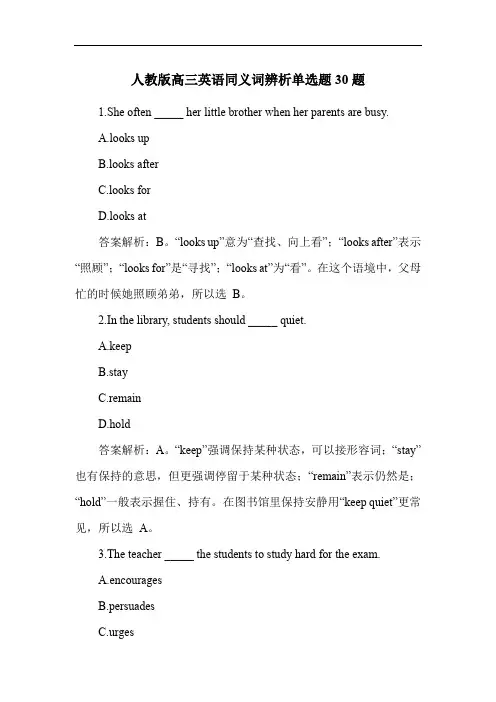
人教版高三英语同义词辨析单选题30题1.She often _____ her little brother when her parents are busy.A.looks upB.looks afterC.looks forD.looks at答案解析:B。
“looks up”意为“查找、向上看”;“looks after”表示“照顾”;“looks for”是“寻找”;“looks at”为“看”。
在这个语境中,父母忙的时候她照顾弟弟,所以选B。
2.In the library, students should _____ quiet.A.keepB.stayC.remainD.hold答案解析:A。
“keep”强调保持某种状态,可以接形容词;“stay”也有保持的意思,但更强调停留于某种状态;“remain”表示仍然是;“hold”一般表示握住、持有。
在图书馆里保持安静用“keep quiet”更常见,所以选A。
3.The teacher _____ the students to study hard for the exam.A.encouragesB.persuadesC.urges答案解析:A。
“encourages”侧重于鼓励、激励;“persuades”是说服某人做某事;“urges”强烈要求;“advises”建议。
老师鼓励学生为考试努力学习,“encourages”更符合语境,所以选A。
4.Don't _____ your time playing computer games.A.wasteB.spendC.takeD.pay答案解析:A。
“waste”表示浪费;“spend”花费时间或金钱做某事;“take”一般用于“it takes sb. some time to do sth.”句型;“pay”主要是支付金钱。
在这个语境中不要浪费时间玩游戏,所以选A。
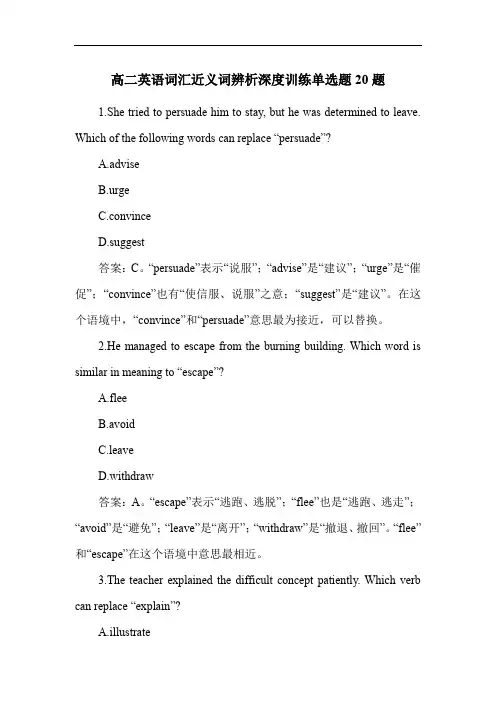
高二英语词汇近义词辨析深度训练单选题20题1.She tried to persuade him to stay, but he was determined to leave. Which of the following words can replace “persuade”?A.adviseB.urgeC.convinceD.suggest答案:C。
“persuade”表示“说服”;“advise”是“建议”;“urge”是“催促”;“convince”也有“使信服、说服”之意;“suggest”是“建议”。
在这个语境中,“convince”和“persuade”意思最为接近,可以替换。
2.He managed to escape from the burning building. Which word is similar in meaning to “escape”?A.fleeB.avoidC.leaveD.withdraw答案:A。
“escape”表示“逃跑、逃脱”;“flee”也是“逃跑、逃走”;“avoid”是“避免”;“leave”是“离开”;“withdraw”是“撤退、撤回”。
“flee”和“escape”在这个语境中意思最相近。
3.The teacher explained the difficult concept patiently. Which verb can replace “explain”?A.illustrateB.demonstrateC.elaborateD.describe答案:A。
“explain”是“解释”;“illustrate”是“举例说明、阐明”;“demonstrate”是“展示、证明”;“elaborate”是“详细阐述”;“describe”是“描述”。
“illustrate”和“explain”在表达对某个概念进行说明解释时意思较为接近。
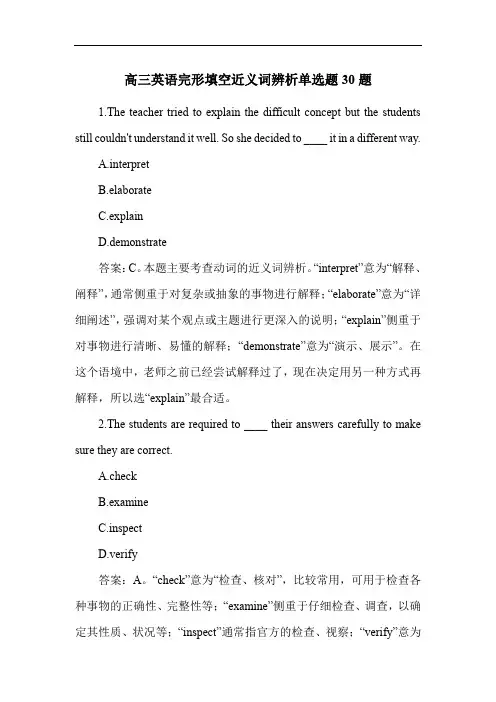
高三英语完形填空近义词辨析单选题30题1.The teacher tried to explain the difficult concept but the students still couldn't understand it well. So she decided to ____ it in a different way.A.interpretB.elaborateC.explainD.demonstrate答案:C。
本题主要考查动词的近义词辨析。
“interpret”意为“解释、阐释”,通常侧重于对复杂或抽象的事物进行解释;“elaborate”意为“详细阐述”,强调对某个观点或主题进行更深入的说明;“explain”侧重于对事物进行清晰、易懂的解释;“demonstrate”意为“演示、展示”。
在这个语境中,老师之前已经尝试解释过了,现在决定用另一种方式再解释,所以选“explain”最合适。
2.The students are required to ____ their answers carefully to make sure they are correct.A.checkB.examineC.inspectD.verify答案:A。
“check”意为“检查、核对”,比较常用,可用于检查各种事物的正确性、完整性等;“examine”侧重于仔细检查、调查,以确定其性质、状况等;“inspect”通常指官方的检查、视察;“verify”意为“核实、查证”,强调确认某事的真实性。
这里学生需要仔细检查答案确保正确,用“check”最恰当。
3.The scientist spent years ____ the mystery of the universe.A.researchingB.studyingC.investigatingD.exploring答案:C。
“research”一般指系统的调查研究;“study”侧重于学习、研究某一学科或主题;“investigate”强调对某一事件、问题等进行调查以了解真相;“explore”意为“探索、探险”,通常指对未知领域的探索。
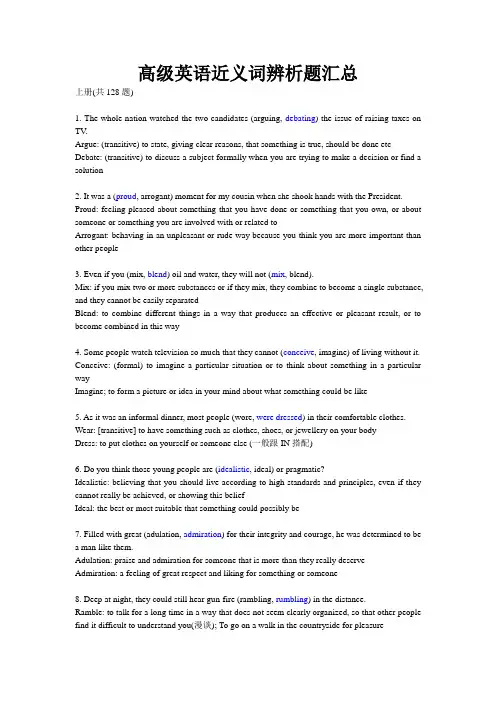
高级英语近义词辨析题汇总上册(共128题)1. The whole nation watched the two candidates (arguing, debating) the issue of raising taxes on TV.Argue: (transitive) to state, giving clear reasons, that something is true, should be done etc Debate: (transitive) to discuss a subject formally when you are trying to make a decision or find a solution2. It was a (proud, arrogant) moment for my cousin when she shook hands with the President. Proud: feeling pleased about something that you have done or something that you own, or about someone or something you are involved with or related toArrogant: behaving in an unpleasant or rude way because you think you are more important than other people3. Even if you (mix, blend) oil and water, they will not (mix, blend).Mix: if you mix two or more substances or if they mix, they combine to become a single substance, and they cannot be easily separatedBlend: to combine different things in a way that produces an effective or pleasant result, or to become combined in this way4. Some people watch television so much that they cannot (conceive, imagine) of living without it. Conceive: (formal) to imagine a particular situation or to think about something in a particular wayImagine; to form a picture or idea in your mind about what something could be like5. As it was an informal dinner, most people (wore, were dressed) in their comfortable clothes. Wear: [transitive] to have something such as clothes, shoes, or jewellery on your bodyDress: to put clothes on yourself or someone else (一般跟IN搭配)6. Do you think those young people are (idealistic, ideal) or pragmatic?Idealistic: believing that you should live according to high standards and principles, even if they cannot really be achieved, or showing this beliefIdeal: the best or most suitable that something could possibly be7. Filled with great (adulation, admiration) for their integrity and courage, he was determined to bea man like them.Adulation: praise and admiration for someone that is more than they really deserve Admiration: a feeling of great respect and liking for something or someone8. Deep at night, they could still hear gun-fire (rambling, rumbling) in the distance.Ramble: to talk for a long time in a way that does not seem clearly organized, so that other people find it difficult to understand you(漫谈); To go on a walk in the countryside for pleasureRumble: to make a series of long low sounds, especially a long distance away from you9. The professor looked over our papers with a hasty (sight, glance).Sight: the act of seeing somethingGlance: to quickly look at someone or something10. Before ordering their dinner, they considered the (relevant, relative) merits of chicken and roast beef.Relevant: directly relating to the subject or problem being discussed or considered(强调与一方相关)Relative: having a particular quality when compared with something else(强调比较)11. the little boy’s constant noise (exhilarated, exasperated) his father, who was busy writing a paper for a symposium(座谈会).Exhilarate: to make someone feel very excited and happyExasperate: to make someone very annoyed by continuing to do something that upsets them12. isn’t it (wholesome, noisome) to live in a city with so many vehicles passing day and night? Wholesome: likely to make you healthyNoisome: very unpleasant13. He was born in a small town (lived, inhabited) by about 500 people.Live: if you live in a place, you have your home thereInhabit: if animals or people inhabit an area or place, they live there14. Her desk was all (jumbled, cluttered) with old papers, strings, and other odds and ends. Jumble: to mix things together in an untidy way, without any order(及物动词经常用于被动,不能作表语)Clutter: to cover or fill a space or room with too many things, so that it looks very untidy(与with 搭配)odds and ends: small things of various kinds without much value(零星东西)15. He thinks they are extremely (idealistic, ideal), for all their pragmatism.Idealistic, ideal: see number 616. She made one last (attraction, appeal) to her father for permission to go to the party. Attraction: a feeling of liking someone, especially in a sexual way(强调双方相互吸引) Appeal: a quality that makes people like something or someone(强调一方吸引另一方)17. The girl looked at the doctor (terrifyingly, terrified). PS:形容人ED,形容事/物ING. Terrifyingly: extremely frightening; scary(表主动)Terrified: very frightened; scared(表被动)18. “If you finish all the homework tonight, we’ll go for a picnic tomorrow,” he (admonished, coaxed).Admonish: (formal) to tell someone severely that they have done something wrongCoax: to persuade someone to do something that they do not want to do by talking to them in a kind, gentle, and patient way19. He thought their behavior was (contemptuous, contemptible), but he didn’t say anythi ng in front of the host.Contemptuous: showing that you think someone or something deserves no respect Contemptible: not deserving any respect at all20. Summoned by the boss, he approached his office full of (apprehension, distrust). Apprehension: anxiety about the future, especially about dealing with something unpleasant or difficult; anxietyDistrust: a feeling that you cannot trust someone21. He was sincerely sorry for what happened at the party, so people accepted his (excuse, apology).Excuse: a reason that you give to explain careless or offensive behavior; a reason that you invent to explain an action and to hide your real intentionsApology: something that you say or write to show that you are sorry for doing something wrong22. They were walking in the forest when they heard a (terrifying, terrific) roar, which made their blood freeze.Terrifying: extremely frighteningTerrific: (informal) very good, especially in a way that makes you feel happy and excited;very large in size or degree(在尺寸和程度上很大)23. Obviously they were getting nowhere with the meeting, so he decided to (desist, resist) from making a final decision that afternoon.Desist: (formal) to stop doing something (跟from搭配)Resist: to stop yourself from having something that you like very much or doing something that you want to do(后面直接加动名词)24. “How can you say that you don’t want to see your grandmother” the fat her (admonished, coaxed).Admonish, coax: see number 1825. The warrior managed to (evade, dodge) the arrow that came flying through the air.Evade: to avoid talking about something, especially because you are trying to hide something(避而不谈); to escape from someone who is trying to catch you(逃避)Dodge: to move quickly to avoid someone or something26. The y speaker’s last few words were (drowned out, stopped) by the audience’s thunderous applauses.Drown out: if a loud noise drowns out another sound, it prevents it from being heardStop: prevent, not continue27. Would I be (intruding, invading) if I joined in your discussion?Intrude: to interrupt someone or become involved in his or her private affairs in an annoying and unwanted wayInvade: to enter a country, town, or area using military force, in order to take control of it28. The (omission, exclusion) of a full stop at the end of the sentence is a deliberate act by the writer.Omission: when you do not include or do not do somethingExclusion: when someone is not allowed to take part in something or enter a place29. The newly-recruited soldiers swore an (oath, promise) of loyalty to their countryOath: a formal and very serious promisePromise: to tell someone that you will definitely do or provide something or that something will happen30. The suspect was accused of (preventing, withholding) some important evidence from the court.Prevent: to stop something from happening, or stop someone from doing somethingWithhold: to refuse to give someone something(隐瞒)31. Whether or not he is the best person for the promotion is (debatable, arguable). Debatable: things that are debatable are not certain because people have different opinions about themArguable: not certain, or not definitely true or correct, and therefore easy to doubt32. He has established himself as a (credible, believable) businessman.Credible: deserving or able to be believed or trusted(可形容人或事)Believable: something that is believable can be believed because it seems possible, likely, or real(只能形容事)33. His story of having discovered the treasure buried by some pirates seemed (incredible, incredulous) to everyoneIncredible: too strange to be believed or very difficult to believeIncredulous: unable or unwilling to believe something34. “But the piano is out of (tone, tune)”, she said in a disappointed (tone, tune).Tone: the way your voice sounds, which shows how you are feeling or what you meanTune: a series of musical notes that are played or sung and are nice to listen to35. Her friends expressed great (sympathy, empathy) to her when her mother died.Sympathy: the feeling of being sorry for someone who is in a bad situation(表具体)Empathy: the ability to understand other people's feelings and problems(表抽象)36. They are now enjoying a short (vocation, vacation) at the seashore.V ocation: the feeling that the purpose of your life is to do a particular type of work, especially because it allows you to help other people(尤指一种能够帮助他人的职业,比如说教师等) Vacation: a holiday, or time spent not working37. A (content, contented) person is one who is happy with what he has.Content: happy and satisfied(因为别人的原因而使你感到满意)Contented: happy and satisfied because your life is good(因为自己的原因而使你感到满意)38. All the streets will be (eliminated, illuminated) tomorrow evening for the celebration. Eliminate:to completely get rid of something that is unnecessary or unwanted(有除掉敌人或淘汰比赛对手意思)Illuminate: to make a light shine on something, or to fill a place with light(原意为照亮,另有阐明的意思)39. Her (perseverance, persistence) in wearing that old-fashioned hat surprised her husband. Perseverance: determination to keep trying to achieve something in spite of difficulties(坚毅) Persistence: determination to do something even though it is difficult or other people oppose it(坚持或固执)40. The effect of the officer’s speech was such that the army recovered it’s (moral, morale) at once.Moral: relating to the principles of what is right and wrong behavior, and with the difference between good and evil(道德)Morale: the level of confidence and positive feelings that people have, especially people who work together, who belong to the same team etc(士气)41. South Africa used to be a country where black people and white people were (separated, segregated).Separate: to divide or split into different parts, if something separates two places or two things, it is between them so that they are not touching each otherSegregate: to separate one group of people from others, especially because they are of a different race, sex, or religion(尤指种族隔离)42. The letter from her sister so (embittered, agitated) her that she stayed awake half the night, trying to think of a way to get back at her.Embitter: angry, sad, or full of hate because of bad or unfair things that have happened to you Agitate: (formal) to make someone feel anxious, upset, and nervous(使不安,另有煽动的意思) Get back at sb.: to do something to hurt or harm someone who has hurt or harmed you43. You haven’t seen him for over a year?” he sounded (incredible, incredulous).Incredible: too strange to be believed or very difficult to believe(表示一种怀疑的态度) Incredulous: unable or unwilling to believe something(表示虽然不愿相信但承认事实)44. No matter what he said, the only response he got from him was a (noncommittal, tentative) “I see”Noncommittal: deliberately not expressing your opinion or intentions clearly(不明朗的) Tentative: not definite or certain, and may be changed later(暂时,试验性的)45. That plan was too (untrue, unrealistic) to be adopted.Untrue: not based on facts that are correctUnrealistic: unrealistic ideas or hopes are not reasonable or sensible46. When people looked at him too (intently, tentatively), he felt very uncomfortable.Intently: giving careful attention to something so that you think about nothing else Tentatively: not definite or certain, and may be changed later(暂时,试验性的)47. Since she didn’t know anybody in that city, she was rather (hesitant, tentative) when accepting the job offer.Hesitant: uncertain about what to do or say because you are nervous or unwillingTentative: done without confidence(这是tentative的第二个意思)48. “Do you really think he will give up the position?” he (scoffed, scold).Scoff: to laugh at a person or idea, and talk about them in a way that shows you think they are stupid; make fun ofScold: to angrily criticize someone, especially a child, about something they have done49. She told the children about her life on the farm all those years ago, how she (got used to, used to) get up at four every morning to milk the cows.Get used to: to have experienced something so that it no longer seems surprising, difficult, strange etcUsed to: if something used to happen, it happened regularly or all the time in the past, but does not happen now50. The teacher told the boys first to (pour, splash) some water on the floor before mopping it. Pour: to make a liquid or other substance flow out of or into a container by holding it at an angle Splash: to make someone or something wet with a lot of small drops of water or other liquid CF: sprinkle51. When he was discovered, the pick-pocket (waved, flapped) a knife to threaten the people around him.Wave: to raise your arm and move your hand from side to side in order to make someone notice youFlap: to move quickly up and down or from side to side, often making a noise52. The eagle suddenly (drifted, swooped) down and snatched the piece of meat.Drift: to move slowly on water or in the airSwoop: if a bird or aircraft swoops, it moves suddenly down through the air, especially in order to attack something53. With the help of the specially trained dogs, they were able to (rescue, save) ten people buried in the snow.Rescue: to save someone or something from a situation of danger or harm(强调营救的过程) Save: to make someone or something safe from danger, harm, or destruction(强调安全)54. His feet were numb with cold; as soon as he got into the room he started (rubbing, stroking) them vigorously.Rub: to move your hand, or something such as a cloth, backwards and forwards over a surface while pressing firmlyStroke: to move your hand gently over somethingNumb means unable to feel anything55. The kitchen floor has to be (scrubbed, scraped) every other day.Scrub: to rub something hard, especially with a stiff brush, in order to clean itScrape: to rub against a rough surface in a way that causes slight damage or injury, or to make something do this56. Every night before he went to bed, he (made a point, made a plan) of checking all the doors and windows.Made a point: to do something deliberately, even when it involves making a special effortMade a plan: plan to do something57. Students of English are required to (remember, memorize) the listed 2000 words. Remember: to have a picture or idea in your mind of people, events, places etc from the past Memorize: to learn words, music etc so that you know them perfectly58. You should not be (intolerable, intolerant) of different religious beliefs.Intolerable: too difficult, bad, annoying etc for you to accept or deal with(句子主语表示动作的对象)Intolerant: not willing to accept ways of thinking and behaving that are different from your own59. He tried to (infuse, fill) the awkward situation with humor.Infuse: (formal) to fill something or someone with a particular feeling or quality(表抽象)跟with 搭配Fill: if a container or place fills, or if you fill it, enough of something goes into it to make it full(表具体)60. We have a sense of working towards a (common, ordinary) goal.Common: common aims, beliefs, ideas etc are shared by several people or groups(这是common 特有的意思表示共同的)Ordinary: average, common, or usual, not different or special61. The virus can only be transmitted through (familiar, intimate) contact.Familiar: someone or something that is familiar is well-known to you and easy to recognize Intimate: relating to sex(在本句中的意思) ;Private and friendly so that you feel comfortable62. It suddenly (happened, occurred) to him that he had worked for twelve hours without eating anything.Happen: if you happen to do something, you do it by chanceOccur: if an idea or thought occurs to you, it suddenly comes into your mind63. The students waited in (respectable, respectful) silence for the Noble Prize winner to make his speech.Respectable: someone who is respectable behaves in a way that is considered socially acceptable Respectful: feeling or showing respect64. The children suffer most when their parents (divide, separate).Divide: if something divides, or if you divide it, it separates into two or more partsSeparate: if two people who are married or have been living together separate, they start to live apart65. The teacher (allotted, divided) the children into several small groups for the trip to the Palace Museum.Allot: to use a particular amount of time for something, or give a particular share of money, space etc to someone or somethingDivide: if something divides, or if you divide it, it separates into two or more parts66. Around mid-night, she received a (mysterious, miraculous) phone call from someone she did not know of.Mysterious: mysterious events or situations are difficult to explain or understandMiraculous: very good, completely unexpected, and often very lucky67. Do you think soil samples are (obtainable, absorbable) from the Mars by an unmanned aircraft in the near future?Obtainable: able to be obtainedAbsorbable:可吸收的,容易吸收的68. She was so dear to him that he still kept her picture in a (preeminent, prominent) position on his desk.Preeminent:优秀超群的Prominent: something that is in a prominent place is easily seen69. Soft background music will (enhance, increase) a delicious meal.Enhance: to improve somethingIncrease: if you increase something, or if it increases, it becomes bigger in amount, number, ordegree70. He was so disappointed when the manager said that his plan was completely (dismissible, disposable).Dismissible: not deserving to be consideredDisposable: intended to be used once or for a short time and then thrown(一次性) available to be used(可再生的)71. The baby-sitter kept the kids (accompanied, company) until we got back from the theater. Accompany: to go somewhere with someoneCompany:固定搭配keep…company= be with her so that she doesn't feel lonely与谁做伴72. Will the financial (reverse, adverse) prevent you from taking a holiday this summer? Reverse: the exact opposite of what has just been mentionedAdverse: not good or favorable73. The (distribution, allotment) of funds to these universities is decided by the Ministry of Education.Distribution: the act of sharing things among a large group of people in a planned way(普通的分配)Allotment: an amount or share of something such as money or time that is given to someone or something, or the process of doing this(尤指上下级之间的分配)74. The employees are openly (contemptuous, contemptible) of their corrupt manager. Contemptuous, Contemptible: see number 1975. The gardener was asked to cut the bushes (even, equal) with the fence.Even: flat and level, with no parts that are higher than other parts (作形容词表示与持平的) Equal: the same in size, number, amount, value etc as something else76. His handwriting was so tiny that it was hardly (readable, legible).Readable: interesting and enjoyable to read, and easy to understand(因有趣味而可读的) Legible: written or printed clearly enough for you to read(因书写印刷清晰而可读的)77. The (shameful, shameless) family secret was brought to light.Shameful: shameful behavior or actions are so bad that someone should feel ashamed(形容行动或事件)Shameless: not seeming to be ashamed of your bad behavior although other people think you should be ashamed(只能形容人)78. The bus came to a (quick, abrupt) stop, and some passengers lost their balance.Quick: lasting for or taking only a short timeAbrupt: sudden and unexpected79. Mary aired her (grievances, grief) at not being treated fairly by the salesperson.Grievances: a belief that you have been treated unfairly, or an unfair situation or event that affects and upsets you(委屈,冤情)Grief: extreme sadness, especially because someone you love has died80. He felt (daunted, discouraged) by the enormous difficulties involved in completing the construction of the airport in one year.Daunt: to make someone feel afraid or less confident about somethingDiscouraged: no longer having the confidence you need to continue doing something81. There is a (contrariness, contradiction) between what he says and what he does. Contrariness: someone who is contrary deliberately does different things from other people (contrary特有的意思)Contradiction: a difference between two statements, beliefs, or ideas about something that means they cannot both be true82. It was in the (dark, dim) light of the early dawn that I saw a man moving towards me.Dark: if it is dark, there is little or no lightDim: fairly dark or not giving much light, so that you cannot see well83. The poor, sick man is (abused, tormented) b y the policeman’s endless interrogation. Abuse: to treat someone in a cruel and violent way, often sexually(虐待尤指性方面的); to deliberately use something for the wrong purpose or for your own advantage(滥用)Torment: to make someone suffer a lot, especially mentallyInterrogate: to ask someone a lot of questions for a long time in order to get information, sometimes using threats84. Too much food (induces, tempts) sleepiness.Induce: (formal) to persuade someone to do something, especially something that does not seem wise; formal to cause a particular physical condition(这是本句的意思)Tempt: to try to persuade someone to do something by making it seem attractive;85. He (wondered, mediated) for a whole week before making that important decision. Wonder: to think about something that you are not sure about and try to guess what is true, what will happen etcMediate: to try to end a quarrel between two people, groups, countries etc(在本句中表示思量考虑)86. A (n) (literal, exact) translation is not always the best.Literal translation: a translation that translates each word exactly instead of giving the general meaning in a more natural wayExact: completely correct in every detail87. The author declares that the plot and characters of the novel are (imaginary, imaginative). Imaginary: not real, but produced from pictures or ideas in your mind(虚拟的,虚构的)Imaginative: containing new and interesting ideas or good at thinking of new and interesting ideas(富于想象的,爱想象的)CF imaginable: used to emphasize that something includes every possible example of something(可以想象到的)88. We walked for miles along the (twisted, crooked) path in the forest.Twisted: something twisted has been bent in many directions or turned many times, so that it has lost its original shapeCrooked: bent, twisted, or not in a straight line89. We advise girls below twenty not to marry, because they are still emotionally (naive, immature).Naive: not having much experience of how complicated life is, so that you trust people too much and believe that good things will always happenImmature: someone who is immature behaves or thinks in a way that is typical of someone much younger - used to show disapproval90. Her feelings (fluctuated, changed) between excitement and fear.Fluctuate: if a price or amount fluctuates, it keeps changing and becoming higher and lower(与WITH搭配)Change: to become different, or to make something become different91. The police will not hesitate to use (force, compulsion) if they bank robbers still refuse to surrender.Force: violent physical action used to get what you wantCompulsion: a strong and unreasonable desire to do something92. After twenty years of antagonism, the two countries were finally (reconciled, friendly). Reconcile: if you reconcile two ideas, situations, or facts, you find a way in which they can both be true or acceptable(和解)Friendly: behaving towards someone in a way that shows you like them and are ready to talk to them or help them93. To call the air strikes against Yugoslavia peace-keeping is a (downright, thorough) lie. Downright: used to emphasize that something is completely bad or untrueThorough: including every possible detail94. “As red as blood” is a (metaphor, simile)Metaphor: a way of describing something by referring to it as something different and suggesting that it has similar qualities to that thing(隐喻)Simile: an expression that describes something by comparing it with something else, using the words 'as' or 'like', for example 'as white as snow(明喻)95. The sight of the snake gave me the (trembling, shivers).Trembling: shaking slightly in a way that you cannot control, especially because you are upset or frightenedShiver: give sb. The shivers=informal to make you feel afraid(固定搭配,除此以外trembling和shiver同义词)96. Although the children found the fables most (readable, understandable), they sometimes missed the messages of the stories.Readable:见No.76Understandable: seem normal and reasonable because of the situation you are in97. The office buildings with their (desirable, desired) locations are very much in demand. Desirable: something that is desirable is worth having or doing(正式用法)Desired: to want to have sex with someone(文学上特指这个意思)98. Driving after drinking Whiskey (is about, is apt) to cause traffic accidents.Be about to: if someone is about to do something, or if something is about to happen, they will do it or it will happen very soonBe apt to: to have a natural tendency to do something99. I don’t want the (actual, literal) meaning of the word, I’m asking you its figurative sense here. Actual: used to emphasize that something is real or exact(强调确切的,事实的); used to introduce the most important part of an event or activity(强调实质上的)Literal: the literal meaning of a word or expression is its basic or original meaning100. In that part of the world the summer weather is so (varied, variable) that even when the sun is shining brightly you never can be sure if it is going to rain in an hour’s time.Varied: consisting of or including many different kinds of things or people, especially in a way that seems interestingVariable: likely to change often101. He said he would go to the dress rehearsal, (unless, provided) he was not too busy. Unless: used to say that something will happen or be true if something else does not happen or is not trueProvided that: used to say that something will only be possible if something else happens or is done102. Something has been wrong with their marriage for a long time, although she makes (pretenses, excuse) that it is not.Pretense: a way of behaving which is intended to make people believe something that are not true Excuse: to be or give a good reason for someone's careless or offensive behavior两者的区别在于:前者表示事实上是错的,而在主观上去让别人相信是对的,后者表示对于自己所作所为进行的辩解,而别人并不清楚事实上是对是错.103. The Suzhou Style embroidery (requires, acquires) very exquisite skills.Requires: if you are required to do or have something, a law or rule says you must do it or have it Acquires: to obtain something by buying it or being given it104. A lot of retired people play chess to (kill, spend) time.Kill time: to spend time doing something which is not important while you are waiting to do something important or waiting for something else to happen(固定搭配)(强调事情的不重要性) Spend: to use time doing a particular thing or pass time in a particular place(不论事情的重要性)105. He knows that his parents have to work very hard in order to provide for his education, so he never (spends, squanders) money.Spend: to use your money to pay for goods or servicesSquander: to carelessly waste money, time, opportunities etc106. He wanted a (transcript, manuscript) of the report to show to his friends.Transcript: a written or printed copy of a speech, conversation etc(打印稿,手抄稿,强调可以复制成多份)Manuscript: a book or piece of writing before it is printed(手稿,原稿,强调只有一份)107. The workers were filled with (indignity, indignation) when they discovered that they were secretly watched during working hours.Indignity: a situation that makes you feel very ashamed and not respectedIndignation: feelings of anger and surprise because you feel insulted or unfairly treated108. People should (clean, purge) their minds of too strong a desire for money.Clean: to remove dirt from something by rubbing or washing(指清洁物质世界的东西)Purge: (literary) to remove bad feelings(专指净化,清除思想上的东西)109. The policemen risked their lives in order to (preserve, protect) the children.Preserve: to save something or someone from being harmed or destroyed(挽救正在被破坏,受害的人或物,另还有维持(和平),保存(食品)的意思)Protect: to keep someone or something safe from harm, damage, or illness(使人或物免于受到破坏,伤害)110. In the past year, quite a few (dormant, unimportant) women’s organizations became active again.Dormant: not active or not growing at the present time but able to be active later(休眠状态的) Unimportant: not important111. The newspaper’s (mistake, distortion) of the incident needs to be looked into.Mistake: something that has been done in the wrong way, or an opinion or statement that is incorrectDistortion: to report something in a way that is not completely true or correct112. The heroic deeds of the firefighters should be (glamorized, praised).。
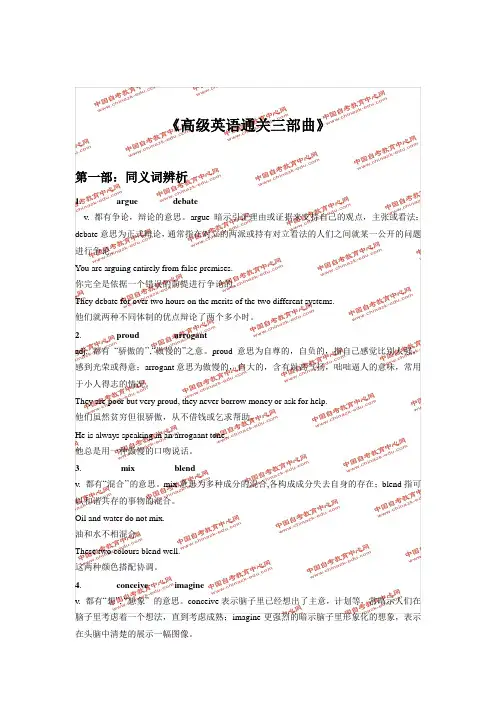
《高级英语通关三部曲》第一部:同义词辨析1. argue debatev. 都有争论,辩论的意思。
argue 暗示引证理由或证据来支持自己的观点,主张或看法;debate意思为正式辩论,通常指在对立的两派或持有对立看法的人们之间就某一公开的问题进行争论。
You are arguing entirely from false premises.你完全是依据一个错误的前提进行争论的。
They debate for over two hours on the merits of the two different systems.他们就两种不同体制的优点辩论了两个多小时。
2. proud arrogantadj. 都有“骄傲的’’,“傲慢的”之意。
proud 意思为自尊的,自负的,指自己感觉比别人强,感到光荣或得意;arrogant意思为傲慢的,自大的,含有趾高气扬,咄咄逼人的意味,常用于小人得志的情况。
They are poor but very proud, they never borrow money or ask for help.他们虽然贫穷但很骄傲,从不借钱或乞求帮助。
He is always speaking in an arrogaant tone.他总是用一种傲慢的口吻说话。
3. mix blendv. 都有“混合’’的意思。
mix意思为多种成分的混合,各构成成分失去自身的存在;blend指可以和谐共存的事物的混合。
Oil and water do not mix.油和水不相混合。
These two colours blend well.这两种颜色搭配协调。
4. conceive imaginev. 都有“想”, “想象” 的意思。
conceive表示脑子里已经想出了主意,计划等,常暗示人们在脑子里考虑着一个想法,直到考虑成熟;imagine更强烈的暗示脑子里形象化的想象,表示在头脑中清楚的展示一幅图像。
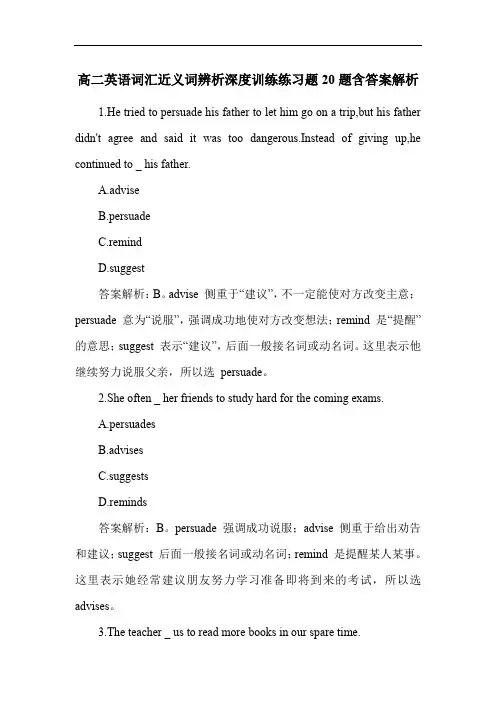
高二英语词汇近义词辨析深度训练练习题20题含答案解析1.He tried to persuade his father to let him go on a trip,but his father didn't agree and said it was too dangerous.Instead of giving up,he continued to _ his father.A.adviseB.persuadeC.remindD.suggest答案解析:B。
advise 侧重于“建议”,不一定能使对方改变主意;persuade 意为“说服”,强调成功地使对方改变想法;remind 是“提醒”的意思;suggest 表示“建议”,后面一般接名词或动名词。
这里表示他继续努力说服父亲,所以选persuade。
2.She often _ her friends to study hard for the coming exams.A.persuadesB.advisesC.suggestsD.reminds答案解析:B。
persuade 强调成功说服;advise 侧重于给出劝告和建议;suggest 后面一般接名词或动名词;remind 是提醒某人某事。
这里表示她经常建议朋友努力学习准备即将到来的考试,所以选advises。
3.The teacher _ us to read more books in our spare time.A.persuadedB.advisedC.suggestedD.reminded答案解析:B。
persuade 通常是成功说服某人做某事;advise 是给建议;suggest 后面一般接名词或动名词;remind 是提醒。
老师建议我们在业余时间多读书,所以选advised。
4.My mother _ me that I should take an umbrella with me because it might rain.A.persuadedB.advisedC.suggestedD.reminded答案解析:D。
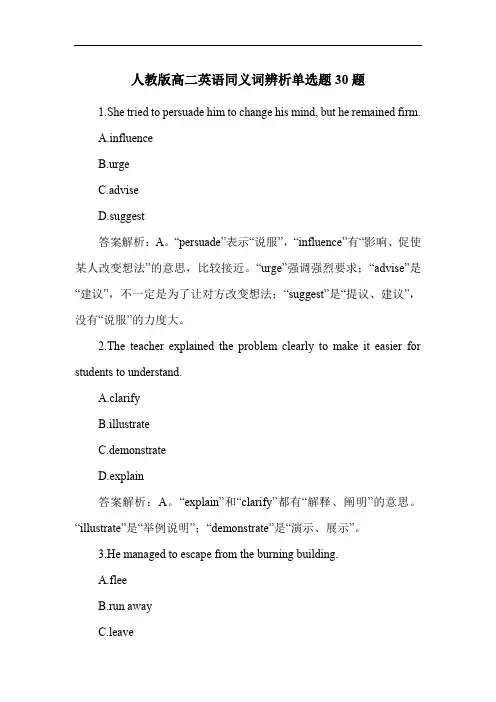
人教版高二英语同义词辨析单选题30题1.She tried to persuade him to change his mind, but he remained firm.A.influenceB.urgeC.adviseD.suggest答案解析:A。
“persuade”表示“说服”,“influence”有“影响、促使某人改变想法”的意思,比较接近。
“urge”强调强烈要求;“advise”是“建议”,不一定是为了让对方改变想法;“suggest”是“提议、建议”,没有“说服”的力度大。
2.The teacher explained the problem clearly to make it easier for students to understand.A.clarifyB.illustrateC.demonstrateD.explain答案解析:A。
“explain”和“clarify”都有“解释、阐明”的意思。
“illustrate”是“举例说明”;“demonstrate”是“演示、展示”。
3.He managed to escape from the burning building.A.fleeB.run awayC.leaveD.withdraw答案解析:A。
“escape”和“flee”都有“逃跑、逃离”的意思。
“run away”比较口语化;“leave”只是“离开”,不一定是因为危险而逃离;“withdraw”有“撤退、收回”的意思,不如“flee”在这个语境中合适。
4.The company decided to expand its business overseas.A.enlargeB.extendC.spreadD.increase答案解析:B。
“expand”和“extend”都有“扩展、扩大”的意思。
“enlarge”主要指尺寸、规模等的扩大;“spread”是“传播、扩散”;“increase”是“增加”,侧重于数量的增加。
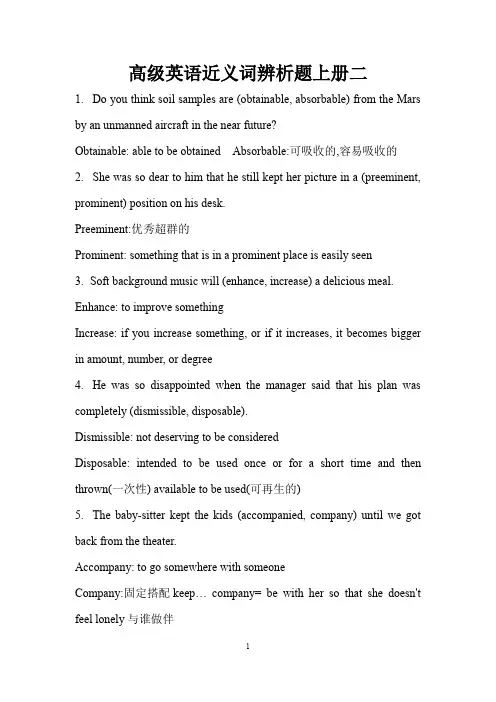
高级英语近义词辨析题上册二1.Do you think soil samples are (obtainable, absorbable) from the Mars by an unmanned aircraft in the near future?Obtainable: able to be obtained Absorbable:可吸收的,容易吸收的2.She was so dear to him that he still kept her picture in a (preeminent, prominent) position on his desk.Preeminent:优秀超群的Prominent: something that is in a prominent place is easily seen3.Soft background music will (enhance, increase) a delicious meal. Enhance: to improve somethingIncrease: if you increase something, or if it increases, it becomes bigger in amount, number, or degree4.He was so disappointed when the manager said that his plan was completely (dismissible, disposable).Dismissible: not deserving to be consideredDisposable: intended to be used once or for a short time and then thrown(一次性) available to be used(可再生的)5.The baby-sitter kept the kids (accompanied, company) until we got back from the theater.Accompany: to go somewhere with someoneCompany:固定搭配keep… company= be with her so that she doesn't feel lonely与谁做伴6.Will the financial (reverse, adverse) prevent you from taking a holiday this summer?Reverse: the exact opposite of what has just been mentioned Adverse: not good or favorable7.The (distribution, allotment) of funds to these universities is decided by the Ministry of Education.Distribution: the act of sharing things among a large group of people in a planned way(普通的分配)Allotment: an amount or share of something such as money or time that is given to someone or something, or the process of doing this(尤指上下级之间的分配)8.The employees are openly (contemptuous, contemptible) of theircorrupt manager.Contemptuous, Contemptible: see number 199.The gardener was asked to cut the bushes (even, equal) with the fence. Even: flat and level, with no parts that are higher than other parts (作形容词表示与持平的)Equal: the same in size, number, amount, value etc as something else 10.H is handwriting was so tiny that it was hardly (readable, legible). Readable: interesting and enjoyable to read, and easy to understand(因有趣味而可读的)Legible: written or printed clearly enough for you to read(因书写印刷清晰而可读的)11.T he (shameful, shameless) family secret was brought to light. Shameful: shameful behavior or actions are so bad that someone should feel ashamed(形容行动或事件)Shameless: not seeming to be ashamed of your bad behavior although other people think you should be ashamed(只能形容人)12.T he bus came to a (quick, abrupt) stop, and some passengers lost theirbalance.Quick: lasting for or taking only a short timeAbrupt: sudden and unexpected13.M ary aired her (grievances, grief) at not being treated fairly by thesalesperson.Grievances: a belief that you have been treated unfairly, or an unfair situation or event that affects and upsets you(委屈,冤情)Grief: extreme sadness, especially because someone you love has died 14.He felt (daunted, discouraged) by the enormous difficulties involved in completing the construction of the airport in one year.Daunt: to make someone feel afraid or less confident about something Discouraged: no longer having the confidence you need to continue doing something15.T here is a (contrariness, contradiction) between what he says and whathe does.Contrariness: someone who is contrary deliberately does different things from other people (contrary特有的意思)Contradiction: a difference between two statements, beliefs, or ideas about something that means they cannot both be true16.It was in the (dark, dim) light of the early dawn that I saw a man moving towards me.Dark: if it is dark, there is little or no lightDim: fairly dark or not giving much light, so that you cannot see well 17.The poor, sick man is (abused, tormented) by the policeman’s endless interrogation.Abuse: to treat someone in a cruel and violent way, often sexually(虐待尤指性方面的); to deliberately use something for the wrong purpose or for your own advantage(滥用)Torment: to make someone suffer a lot, especially mentally Interrogate: to ask someone a lot of questions for a long time in order to get information, sometimes using threats18.T oo much food (induces, tempts) sleepiness.Induce: (formal) to persuade someone to do something, especially something that does not seem wise; formal to cause a particular physical condition(这是本句的意思)Tempt: to try to persuade someone to do something by making it seem attractive;19.H e (wondered, mediated) for a whole week before making thatimportant decision.Wonder: to think about something that you are not sure about and try to guess what is true, what will happen etcMediate: to try to end a quarrel between two people, groups, countries etc(在本句中表示思量考虑)20.A (n) (literal, exact) translation is not always the best.Literal translation: a translation that translates each word exactly instead of giving the general meaning in a more natural wayExact: completely correct in every detail21.The author declares that the plot and characters of the novel are (imaginary, imaginative).Imaginary: not real, but produced from pictures or ideas in your mind(虚拟的,虚构的)Imaginative: containing new and interesting ideas or good at thinking of new and interesting ideas(富于想象的,爱想象的)CF imaginable: used to emphasize that something includes every possible example of something(可以想象到的)22.W e walked for miles along the (twisted, crooked) path in the forest. Twisted: something twisted has been bent in many directions or turned many times, so that it has lost its original shapeCrooked: bent, twisted, or not in a straight line23.We advise girls below twenty not to marry, because they are still emotionally (naive, immature).Naive: not having much experience of how complicated life is, so that you trust people too much and believe that good things will always happenImmature: someone who is immature behaves or thinks in a way that is typical of someone much younger - used to show disapproval24.H er feelings (fluctuated, changed) between excitement and fear. Fluctuate: if a price or amount fluctuates, it keeps changing and becoming higher and lower(与WITH搭配)Change: to become different, or to make something become different 25.The police will not hesitate to use (force, compulsion) if they bank robbers still refuse to surrender.Force: violent physical action used to get what you want Compulsion: a strong and unreasonable desire to do something26.After twenty years of antagonism, the two countries were finally (reconciled, friendly).Reconcile: if you reconcile two ideas, situations, or facts, you find a way in which they can both be true or acceptable(和解)Friendly: behaving towards someone in a way that shows you like them and are ready to talk to them or help them27.To call the air strikes against Yugoslavia peace-keeping is a(downright, thorough) lie.Downright: used to emphasize that something is completely bad or untrue Thorough: including every possible detail28.“As red as blood” is a (metaphor, simile)Metaphor: a way of describing something by referring to it as something different and suggesting that it has similar qualities to that thing(隐喻)Simile: an expression that describes something by comparing it with something else, using the words 'as' or 'like', for example 'as white as snow(明喻)29.T he sight of the snake gave me the (trembling, shivers). Trembling: shaking slightly in a way that you cannot control, especially because you are upset or frightened Shiver: give sb. The shivers=informal to make you feel afraid(固定搭配,除此以外trembling和shiver同义词) 30.Although the children found the fables most (readable, understandable), they sometimes missed the messages of the stories.Readable:见No.76Understandable: seem normal and reasonable because of the situation you are in31.The office buildings with their (desirable, desired) locations are very much in demand.Desirable: something that is desirable is worth having or doing(正式用法)Desired: to want to have sex with someone(文学上特指这个意思)32.D riving after drinking Whiskey (is about, is apt) to cause trafficaccidents.Be about to: if someone is about to do something, or if something is about to happen, they will do it or it will happen very soon Be apt to: to havea natural tendency to do something33.I don’t want the (actual, literal) meaning of the word, I’m asking you its figurative sense here.Actual: used to emphasize that something is real or exact(强调确切的,事实的); used to introduce the most important part of an event or activity(强调实质上的)Literal: the literal meaning of a word or expression is its basic or original meaning34.In that part of the world the summer weather is so (varied, variable) that even when the sun is shining brightly you never can be sure if it is going to rain in an hour’s time.Varied: consisting of or including many different kinds of things or people, especially in a way that seems interesting Variable: likely to change often35.H e said he would go to the dress rehearsal, (unless, provided) he wasnot too busy.Unless: used to say that something will happen or be true if somethingelse does not happen or is not true Provided that: used to say that something will only be possible if something else happens or is done 36.Something has been wrong with their marriage for a long time, although she makes (pretenses, excuse) that it is not.Pretense: a way of behaving which is intended to make people believe something that are not true Excuse: to be or give a good reason for someone's careless or offensive behavior两者的区别在于:前者表示事实上是错的,而在主观上去让别人相信是对的,后者表示对于自己所作所为进行的辩解,而别人并不清楚事实上是对是错.37.T he Suzhou Style embroidery (requires, acquires) very exquisiteskills.Requires: if you are required to do or have something, a law or rule says you must do it or have it Acquires: to obtain something by buying it or being given it38.A lot of retired people play chess to (kill, spend) time.Kill time: to spend time doing something which is not important while you are waiting to do something important or waiting for something else to happen(固定搭配)(强调事情的不重要性)Spend: to use time doing a particular thing or pass time in a particular place(不论事情的重要性)39.He knows that his parents have to work very hard in order to provide for his education, so he never (spends, squanders) money.Spend: to use your money to pay for goods or servicesSquander: to carelessly waste money, time, opportunities etc40.H e wanted a (transcript, manuscript) of the report to show to hisfriends.Transcript: a written or printed copy of a speech, conversation etc(打印稿,手抄稿,强调可以复制成多份)Manuscript: a book or piece of writing before it is printed(手稿,原稿,强调只有一份)41.T he workers were filled with (indignity, indignation) when theydiscovered that they were secretly watched during working hours. Indignity: a situation that makes you feel very ashamed and not respected Indignation: feelings of anger and surprise because you feel insulted or unfairly treated42.P eople should (clean, purge) their minds of too strong a desire formoney.Clean: to remove dirt from something by rubbing or washing(指清洁物质世界的东西)Purge: (literary) to remove bad feelings(专指净化,清除思想上的东西) 43.T he policemen risked their lives in order to (preserve, protect) thechildren.Preserve: to save something or someone from being harmed or destroyed(挽救正在被破坏,受害的人或物,另还有维持(和平),保存(食品)的意思)Protect: to keep someone or something safe from harm, damage, or illness(使人或物免于受到破坏,伤害)44.In the past year, quite a few (dormant, unimportant) women’s organizations became active again.Dormant: not active or not growing at the present time but able to be active later(休眠状态的) Unimportant: not important45.T he newspaper’s (mistake, distortion) of the incident needs to belooked into.Mistake: something that has been done in the wrong way, or an opinion or statement that is incorrectDistortion: to report something in a way that is not completely true or correct46.T he heroic deeds of the firefighters should be (glamorized, praised). Glamorize: to make something seem more attractive than it really is Praise: to say that you admire and approve of someone or something, especially publicly47.S he sensed (intrinsically, instinctively) that somebody is following her. Intrinsically: being part of the nature or character of someone or something(本质地)Instinctively: based on instinct and not involving thought(本能地)48.She is (occupied, preoccupied) with some urgent work and can’t see you today. Be occupied with: busy doing somethingBe preoccupy with: thinking about something a lot, with the result that you do not pay attention to other things49.W hen the twins wear the same kind of clothes, they are almost (indistinct, indistinguishable).Indistinct: an indistinct sound, image, or memory cannot be seen, heard, or remembered clearly(模糊的)Indistinguishable: things that are indistinguishable are so similar that you cannot see any difference between them50.T he (instinctive, intrinsic) quality of a person is more important thanhis/her appearance.Instinctive: based on instinct and not involving thought(本能的) Intrinsic: being part of the nature or character of someone or something(本质的)51.(As long as, in so far as) human beings can’t live completely and harmoniously, according to Huxley, men and women will never be beautiful.As long as:只要; In so far as: (formal) to the degree that (到….的程度,在…..范围内)52.T hey improved their pronunciation by (imitating, mimicing) theirteacher.Imitate: to copy the way someone behaves, speaks, moves etc, especially in order to make people laugh Mimic: to copy the way someone speaks or behaves, especially in order to make people laugh53.The way in which TV can (affect, effect) a person’s thinking should never be overlooked.Affect: to do something that produces an effect or change in something or in someone's situation Effect: to make something happen54.She said that she would (preserve, reserve) the right to take the issue to a higher authority.Preserve: SEE NO.109Reserve: (formal) if you reserve the right to do something, you will do it if you think it is necessary - used especially in notices or official documents55.T hat year he published his first book, which was a (spacious, huge)success.Spacious: a spacious house, room etc is large and has plenty of space to move around in Huge: extremely large in size, amount, or degree; enormous56.T he company is seeking to (recruit, register) young managers. Recruit: to find new people to work in a company, join an organization, do a job etcRegister: to put someone's or something's name on an official list57.“Hong Kong Morning” is an (biographical, autobiographical) novel that depicts all types of people in Hong Kong an d the author’s own struggle with himself.Biographical: a book that tells what has happened in someone's life, written by someone elseAutobiographical: a book in which someone writes about their own life, or books of this type58.H e cut stone with a knife and (blunted, blurted) the edge.Blunt: to make the point of a pencil or the edge of a knife less sharp Blurt: to say something suddenly and without thinking, usually because you are nervous or excited59.The US economy is still growing at a spectacular (ratio, rate), but there are hidden problems with it.Ratio: a relationship between two amounts, represented by a pair of numbers showing how much bigger one amount is than the other Rate: the number of times something happens, or the number of examples of something within a certain period60.The parents received only $3000 as a (reward, compensation) for the loss of their son killed in a car crash.Reward: something that you get because you have done something good or helpful or have worked hard; prize; benefit compensation: money paidto someone because they have suffered injury or loss, or because something they own has been damaged; 法律上叫damages61.The strength of domestic (demand, command) was the main engine of growth in both countries.Demand: the need or desire that people have for particular goods and services command: an order that should be obeyed62.In order not to hurt her feelings, he just (played down, play along) with her suggestion, although it was not what he really wanted.Play down: to try to make something seem less important or less likely than it really is(淡化)Play along: to pretend to agree to do what someone wants, in order to avoid annoying them or to get an advantage(假意作某事)。
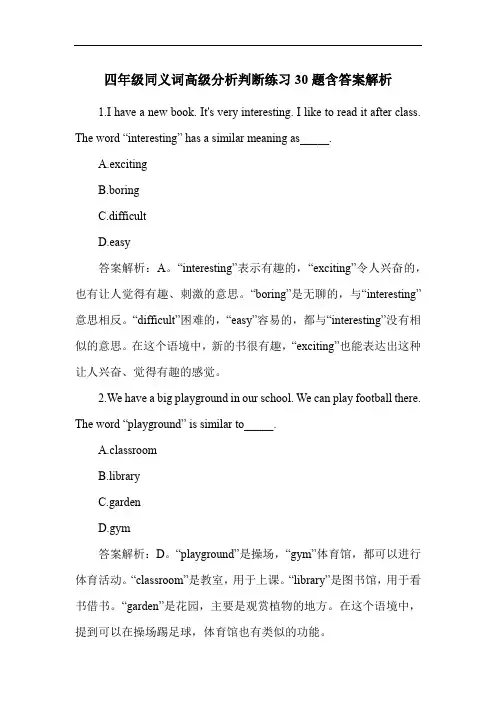
四年级同义词高级分析判断练习30题含答案解析1.I have a new book. It's very interesting. I like to read it after class. The word “interesting” has a similar meaning as_____.A.excitingB.boringC.difficultD.easy答案解析:A。
“interesting”表示有趣的,“exciting”令人兴奋的,也有让人觉得有趣、刺激的意思。
“boring”是无聊的,与“interesting”意思相反。
“difficult”困难的,“easy”容易的,都与“interesting”没有相似的意思。
在这个语境中,新的书很有趣,“exciting”也能表达出这种让人兴奋、觉得有趣的感觉。
2.We have a big playground in our school. We can play football there. The word “playground” is similar to_____.A.classroomB.libraryC.gardenD.gym答案解析:D。
“playground”是操场,“gym”体育馆,都可以进行体育活动。
“classroom”是教室,用于上课。
“library”是图书馆,用于看书借书。
“garden”是花园,主要是观赏植物的地方。
在这个语境中,提到可以在操场踢足球,体育馆也有类似的功能。
3.Our teacher is very kind. She always helps us. The word “kind” is like_____.A.strictB.meanC.friendlyzy答案解析:C。
“kind”表示善良的,“friendly”友好的,意思相近。
“strict”严格的,与“kind”相反。
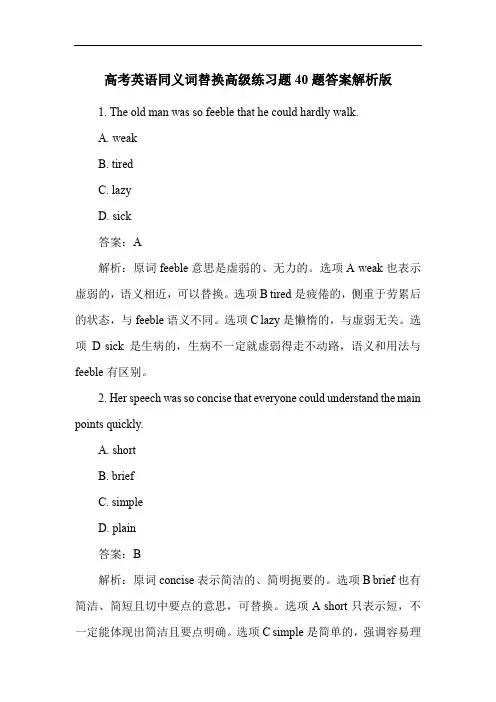
高考英语同义词替换高级练习题40题答案解析版1. The old man was so feeble that he could hardly walk.A. weakB. tiredC. lazyD. sick答案:A解析:原词feeble意思是虚弱的、无力的。
选项A weak也表示虚弱的,语义相近,可以替换。
选项B tired是疲倦的,侧重于劳累后的状态,与feeble语义不同。
选项C lazy是懒惰的,与虚弱无关。
选项D sick是生病的,生病不一定就虚弱得走不动路,语义和用法与feeble有区别。
2. Her speech was so concise that everyone could understand the main points quickly.A. shortB. briefC. simpleD. plain答案:B解析:原词concise表示简洁的、简明扼要的。
选项B brief也有简洁、简短且切中要点的意思,可替换。
选项A short只表示短,不一定能体现出简洁且要点明确。
选项C simple是简单的,强调容易理解,但不一定是表达简洁。
选项D plain是朴素的、简单的,主要指外观或风格,语义与concise不同。
3. The accident occurred at the crossroads.A. happenedB. took placeC. broke outD. showed up答案:A解析:原词occur表示发生,尤指意外事件的发生。
选项 A happened也表示发生,是最接近occur的同义词,可以替换。
选项B took place通常表示有计划、有安排的发生。
选项C broke out常指战争、火灾等突然爆发。
选项D showed up表示出现、露面,与事件发生的语义不同。
4. The boy is very intelligent and always gets good grades.A. cleverB. wiseC. brightD. smart答案:A解析:原词intelligent表示聪明的、有才智的。
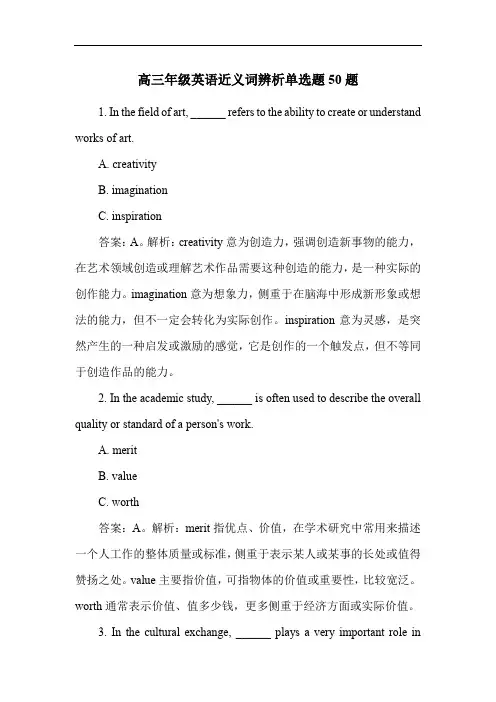
高三年级英语近义词辨析单选题50题1. In the field of art, ______ refers to the ability to create or understand works of art.A. creativityB. imaginationC. inspiration答案:A。
解析:creativity意为创造力,强调创造新事物的能力,在艺术领域创造或理解艺术作品需要这种创造的能力,是一种实际的创作能力。
imagination意为想象力,侧重于在脑海中形成新形象或想法的能力,但不一定会转化为实际创作。
inspiration意为灵感,是突然产生的一种启发或激励的感觉,它是创作的一个触发点,但不等同于创造作品的能力。
2. In the academic study, ______ is often used to describe the overall quality or standard of a person's work.A. meritB. valueC. worth答案:A。
解析:merit指优点、价值,在学术研究中常用来描述一个人工作的整体质量或标准,侧重于表示某人或某事的长处或值得赞扬之处。
value主要指价值,可指物体的价值或重要性,比较宽泛。
worth通常表示价值、值多少钱,更多侧重于经济方面或实际价值。
3. In the cultural exchange, ______ plays a very important role inpromoting understanding between different countries.A. communicationB. connectionC. contact答案:A。
解析:communication意为交流、沟通,在文化交流中,交流对于促进不同国家之间的理解起到非常重要的作用,强调信息的传递和交换。
高级英语近义词辨析整理第1 课1.destroy一词最为常见,主要强调破坏的力度之大和彻底,一般不带感情或修辞色彩。
demolish和raze通常用于巨大物体,如大型建筑物等。
demolish常用引申义,指任何复合体的被毁,如demolish a theory with a few incisive comments。
意即“用几句锋利的评语推翻某种理论”。
而raze几乎无一例外地用于指建筑物的被毁。
annihilate在这些词中所表示的损坏程度最为强烈,字面意思是“化为乌有”,但实际上往往用于指对人或物的严重损伤。
如说annihilate an enemy force,是指使敌军遭到重创,不仅没有还手之力。
而且没有招架之功。
如说annihilate one?s opponent in a debate,是指彻底驳倒对手。
2. decay常指某物自然而然地逐渐衰败腐化。
如:His teeth have begun to decay.(他的牙齿开始老化变坏。
)rot指有机物质,如蔬菜等因菌毒感染而腐败变质,如:rotting apples(烂了的苹果)。
spoil用于非正式文体,常指食物变质。
如:Fish spoils quickly in summer。
(鱼在夏天极易变质。
)molder用于指物体缓慢、逐步地腐朽。
如:Old buildings molder away.(老房子渐渐腐烂了。
)disintegrate意指把某物从整体变为碎片或一个个部分。
如:rocks disintegrated by frost and rain(被霜和雨蚀裂成碎块的岩石)。
decompose指将物质分解为其构成成分。
如:Water can be decomposed(be decomposed)into hydrogen and oxygen.(水可分解成氧和氧。
)该词还可用来替代rot,使语气略显委婉。
在给出答案之前,首先将该题中的几个语法术语解释一下。
高考英语词汇辨析近义词反义词单选题30题1.The teacher gave us a lot of ____ on how to improve our English.A.advicesB.suggestionsC.pieces of advicesD.pieces of suggestion答案:B。
“advice”是不可数名词,没有复数形式,A 和C 选项错误;“suggestion”是可数名词,B 选项正确;“pieces of suggestion”表达错误,D 选项错误。
2.We need to buy some ____ for the party.A.foodsB.fruitC.vegetablesD.drinks答案:D。
“food”表示食物时是不可数名词,A 选项错误;“fruit”表示水果时通常是不可数名词,B 选项错误;“vegetables”蔬菜,题干中说为聚会买一些东西,聚会通常需要饮品,D 选项更符合实际场景。
3.I have a lot of ____ to do today.A.worksB.jobC.jobsD.work答案:D。
“work”表示工作时是不可数名词,A 选项错误;“job”是可数名词,题干中“a lot of”后面接不可数名词或可数名词复数,B 和C 选项错误,D 选项正确。
4.The ____ of the book is very interesting.A.contentB.contentsC.contextD.contest答案:A。
“content”表示内容,B 选项“contents”通常指所容纳之物;“context”表示上下文;“contest”表示竞赛。
根据题意,A 选项正确。
5.There are many different kinds of ____ in the zoo.A.animalsB.birdsC.fishesD.insects答案:A。
六年级英语语义辨析高级判断练习题30题(带答案)1. “big” and “large” have the same meaning in English. (True/False)答案:True。
解析:big和large都表示大的,在很多情况下可以互换使用,例如a big house和a large house都表示大房子。
2. “sad” is the opposite of “happy”. (True/False)答案:True。
解析:sad表示悲伤的,happy表示快乐的,它们是一对反义词。
3. The word “like” can be a verb and a preposition. (True/False)答案:True。
解析:like作动词时,如I like apples我喜欢苹果;作介词时,如He looks like his father他看起来像他父亲。
4. “tall” and “high” are always used in the same way. (True/False)答案:False。
解析:tall通常用来形容人、建筑物等的高度,如a tall man;high更多用于形容物体距离地面的高度或抽象概念的高度,如a high mountain或者a high price。
5. “open” has only one meaning. (True/False)答案:False。
解析:open可作动词,意为打开,如open the door;也可作形容词,意为开着的,如The window is open。
6. “cold” and “cool” are synonyms. (True/False)答案:False。
解析:cold表示寒冷的,温度较低;cool表示凉爽的,温度比cold要高一些,它们不是同义词。
7. The word “run” can also mean “manage” in some cases. (True/False)答案:True。
高考英语词汇辨析近义词反义词练习题30题1<背景文章>In the realm of English language learning, understanding the nuances between similar words is crucial. Take the words "big", "large", and "huge" for example. These three words are often used interchangeably, but there are subtle differences. "Big" is a very common word and can be used in a wide variety of situations. It can describe something that is larger than average, but not necessarily extremely large. For instance, a big house might be a comfortable size but not enormous. "Large", on the other hand, implies a greater size than "big". It is often used to describe things that are substantial in size. A large company might have many employees and a significant amount of business. "Huge" is the most extreme of the three. It is used to describe something that is extremely large and often has a sense of impressiveness or astonishment. A huge mountain would be one that is massive and awe-inspiring.Another set of similar words are "fast", "quick", and "rapid". "Fast" generally refers to something that moves at a high speed. A fast car can cover a long distance in a short amount of time. "Quick" emphasizes speed in doing something. A person can be quick to respond or take action. "Rapid" is similar to "fast" but often implies a continuous and intense speed.Rapid growth means that something is growing at a very quick and consistent pace.Understanding these distinctions can help students use the right word in the right context and improve their overall language proficiency.1. The word "big" is different from "large" in that "big" ________.A. is always smaller than "large"B. is used in more situationsC. describes something not extremely largeD. is less common than "large"答案:C。
中华英语学习网www.100yingyu.com 官方网站:圣才学习网www.100xuexi.com 高级英语近义词辨析题汇总下册(共128题) 1. It took him three years to pay off all the debts (occurred, incurred) by buying that new house. Occur: to happen Incur: if you incur a cost, debt, or a fine, you have to pay money because of something you have done, or you do not make money 2. The boy gave an (ingenuous, ingenious) account of what had happened, concealing nothing. Ingenuous: an ingenuous person is simple, trusting, and honest, especially because they have not had much experience of life Ingenious: someone who is ingenious is very good at inventing things or at thinking of new ideas 3. He gave such (implicit, explicit) instructions that everyone understood them. Implicit: suggested or understood without being stated directly Explicit: expressed in a way that is very clear and direct 4. The two brothers (compliment, complement) each other; one is impulsive, the other, cautious. Compliment: to say something nice to someone in order to praise them Complement: to make a good combination with someone or something else(相辅相成,结合得很好) 5. The little boy (stimulated, simulated) illness not to go to school. Stimulate: to encourage or help an activity to begin or develop further Simulate: to make or produce something that is not real but has the appearance or feeling of being real 6. Sitting alone in his room, he (wondered, brooded) over his failure to get a job after a whole year of trying. Wonder: to think about something that you are not sure about and try to guess what is true, what will happen etc Brood: to keep thinking about something that you are worried or upset about 7. She has had a (grudge, malice) against me ever since I turned down her unreasonable request. Grudge: a feeling of dislike for someone because you cannot forget that they harmed you in the past Malice: the desire to harm someone because you hate them 8. After graduating from the business school, he went to work in a big corporation and proved to be quite a (shrewd, cunning) businessman. Shrewd: good at judging what people or situations are really like Cunning: someone who is cunning is clever and good at deceiving people in order to get what they want 9. (Invariably, Unchangeably) strict with himself, he went over the accounts yet another time. Invariably: if something invariably happens or is invariably true, it always happens or is true Unchangeably: not likely to change, or changing often 中华英语学习网www.100yingyu.com 官方网站:圣才学习网www.100xuexi.com 10. Many people are worried by what they think is (unaccustomed, undesirable) scenes on TV for the children. Unaccustomed: not used to something Undesirable: something or someone that is undesirable is not welcome or wanted because they may affect a Situation or person in a bad way 11. It is impossible to sort out all the (squabbles, debates) among the children. Sometimes one just has to ignore them. Squabbles: to argue about something unimportant Debates: to discuss a subject formally when you are trying to make a decision or find a solution 12. It is such a (pitiful, sympathetic) sight to see the elderly people sitting on park benches, lonely and expressionless. Pitiful: someone who is pitiful looks or sounds so sad and unfortunate that you feel very sorry for them(直接修饰人) Sympathetic: caring and feeling sorry about someone's problems(可跟人或物或动作) 13. The party over, the guests gone, she looked at the empty rooms and sank into (anguish, melancholy). Anguish: mental or physical suffering caused by extreme pain or worry Melancholy: a feeling of sadness for no particular reason 14. He (stumbled, tumbled) on the pavement and twisted his ankle. Stumble: to walk in an unsteady way and often almost fall Tumble: to fall down quickly and suddenly, especially with a rolling movement 15. What happened to them on the trip was a nightmare, which left them (unspeakably, pitifully) furious for weeks. Unspeakably: unspeakable feelings are so extreme that it is impossible to describe them Pitifully: very bad in quality(作副词只表示这个意思) (上述为形容词解释) 16. The vulgar commercial which followed broke the (spell, appeal) of the film. Break the spell: to make someone stop paying all their attention to something, or to make a time stop feeling special Appeal: an urgent request for something important(作为名词的其中一个意思)
17. His six-year experience gave him a big (advantage, strength) over the other applicants for the job. Advantage: something that helps you to be more successful than others, or the state of having this Strength: the physical power and energy that makes someone strong 18. These rules and regulations not only apply to the graduate students, but to the school (on the whole, as a whole). on the whole: used to say that something is generally true(大体上,基本上) as a whole: used to say that all the parts of something are being considered together(从总体上来考虑)